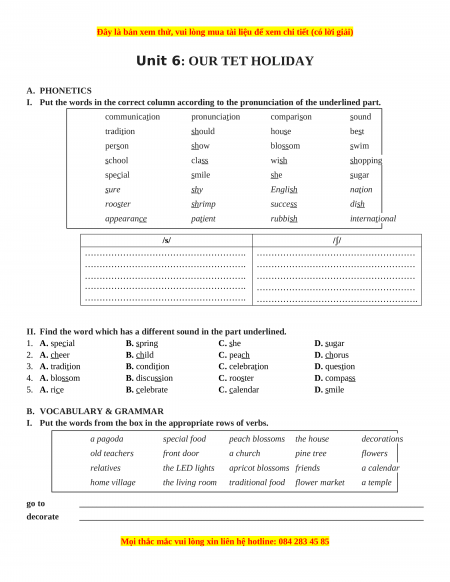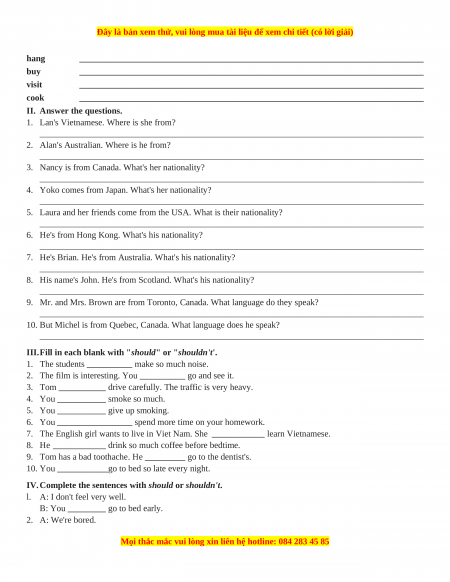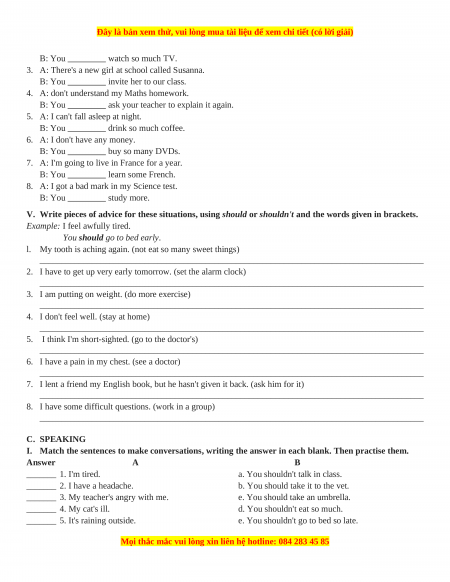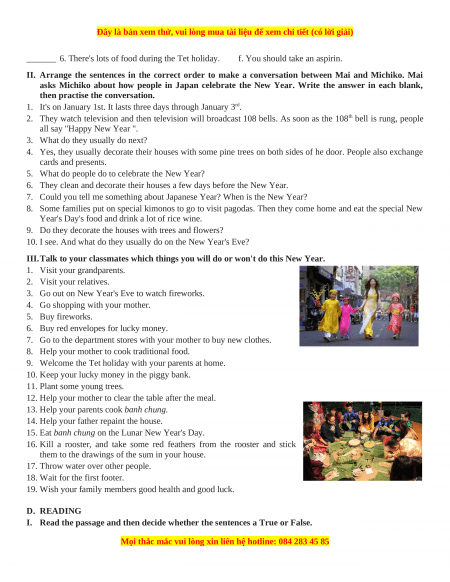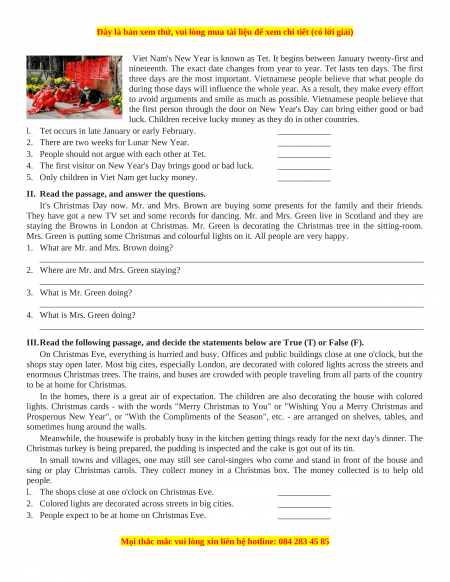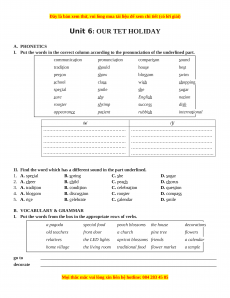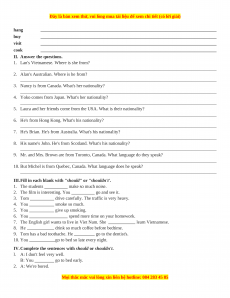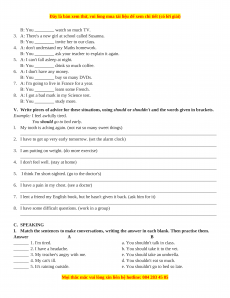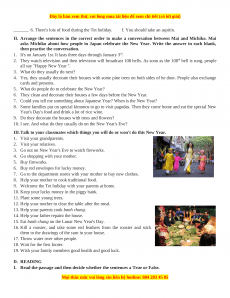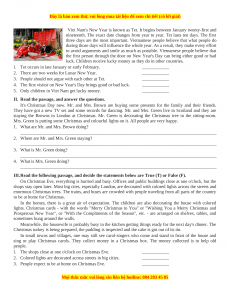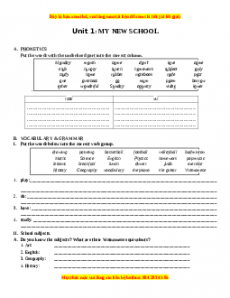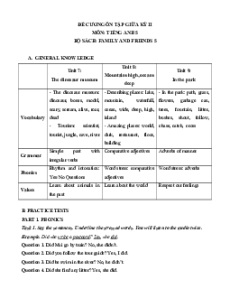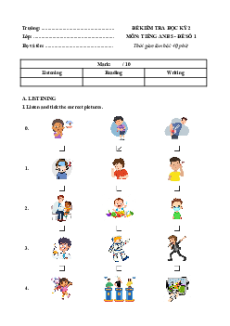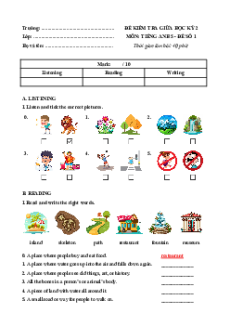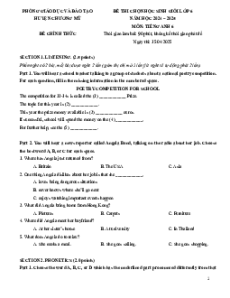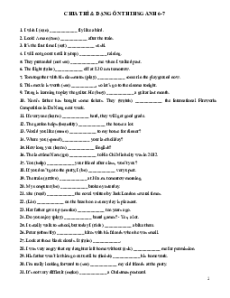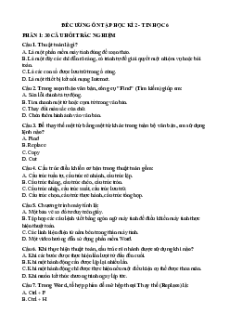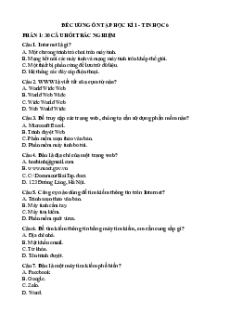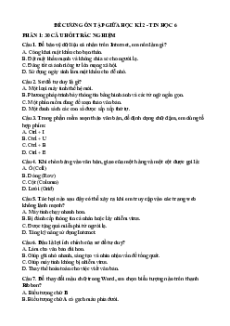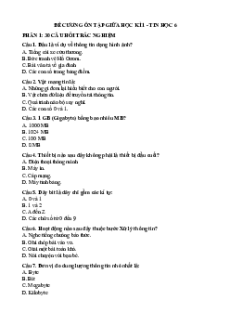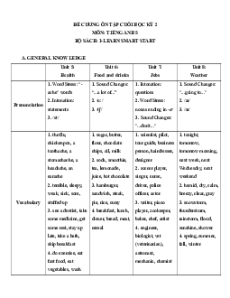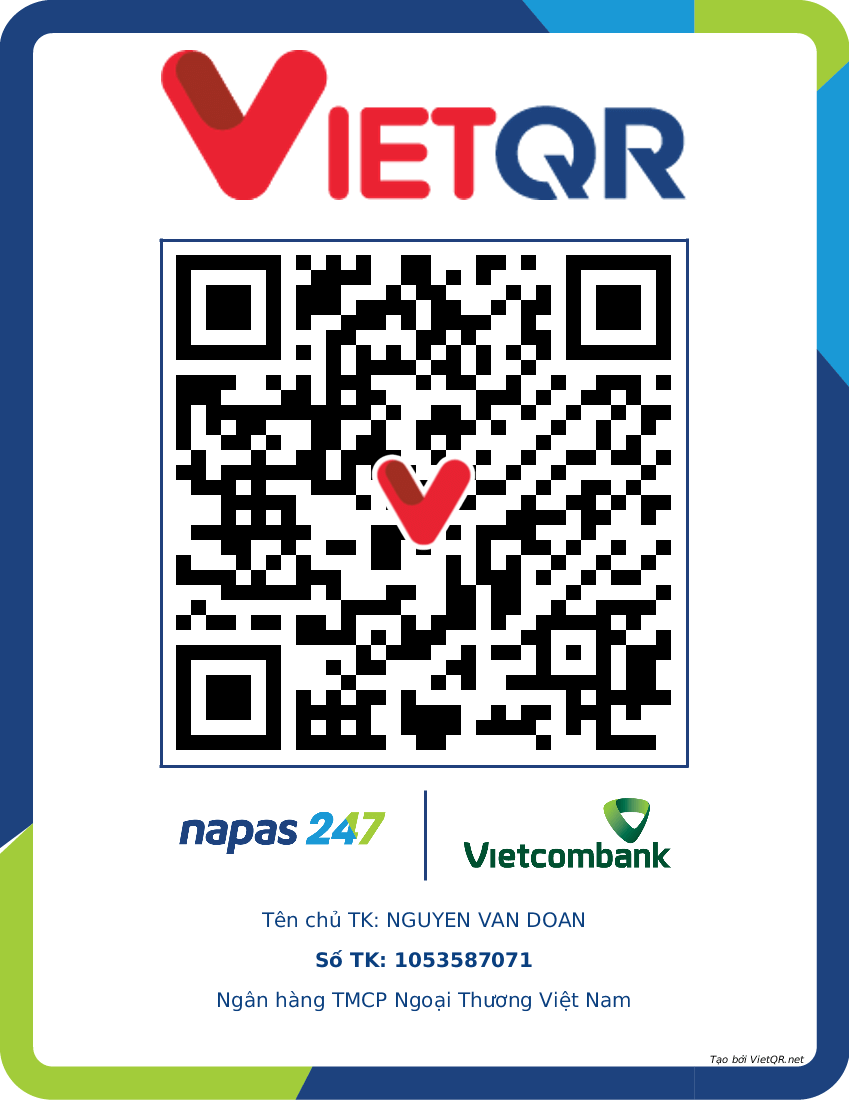Unit 6: OUR TET HOLIDAY A. PHONETICS
I. Put the words in the correct column according to the pronunciation of the underlined part. communication pronunciation comparison sound tradition should house best person show blossom swim school class wish shopping special smile she sugar sure shy English nation rooster shrimp success dish appearance patient rubbish international /s/ /ʃ/
……………………………………………….
………………………………………………
……………………………………………….
………………………………………………
……………………………………………….
………………………………………………
……………………………………………….
………………………………………………
……………………………………………….
……………………………………………….
II. Find the word which has a different sound in the part underlined. 1. A. special B. spring C. she D. sugar 2. A. cheer B. child C. peach D. chorus 3. A. tradition B. condition C. celebration D. question 4. A. blossom B. discussion C. rooster D. compass 5. A. rice B. celebrate C. calendar D. smile
B. VOCABULARY & GRAMMAR
I. Put the words from the box in the appropriate rows of verbs. a pagoda special food
peach blossoms the house decorations old teachers front door a church pine tree flowers relatives the LED lights
apricot blossoms friends a calendar home village the living room
traditional food flower market a temple go to
_______________________________________________________________________________ decorate
_______________________________________________________________________________
hang
_______________________________________________________________________________ buy
_______________________________________________________________________________ visit
_______________________________________________________________________________ cook
_______________________________________________________________________________ II. Answer the questions.
1. Lan's Vietnamese. Where is she from?
________________________________________________________________________________________
2. Alan's Australian. Where is he from?
________________________________________________________________________________________
3. Nancy is from Canada. What's her nationality?
________________________________________________________________________________________
4. Yoko comes from Japan. What's her nationality?
________________________________________________________________________________________
5. Laura and her friends come from the USA. What is their nationality?
________________________________________________________________________________________
6. He's from Hong Kong. What's his nationality?
________________________________________________________________________________________
7. He's Brian. He's from Australia. What's his nationality?
________________________________________________________________________________________
8. His name's John. He's from Scotland. What's his nationality?
________________________________________________________________________________________
9. Mr. and Mrs. Brown are from Toronto, Canada. What language do they speak?
________________________________________________________________________________________
10. But Michel is from Quebec, Canada. What language does he speak?
________________________________________________________________________________________
III.Fill in each blank with "should" or "shouldn't'. 1. The students make so much noise.
2. The film is interesting. You go and see it. 3. Tom
drive carefully. The traffic is very heavy. 4. You smoke so much. 5. You give up smoking. 6. You
spend more time on your homework.
7. The English girl wants to live in Viet Nam. She learn Vietnamese. 8. He
drink so much coffee before bedtime.
9. Tom has a bad toothache. He go to the dentist's. 10. You
go to bed so late every night.
IV. Complete the sentences with should or shouldn't.
l. A: I don't feel very well. B: You go to bed early. 2. A: We're bored.
B: You watch so much TV.
3. A: There's a new girl at school called Susanna. B: You invite her to our class.
4. A: don't understand my Maths homework. B: You
ask your teacher to explain it again.
5. A: I can't fall asleep at night. B: You drink so much coffee. 6. A: I don't have any money. B: You buy so many DVDs.
7. A: I'm going to live in France for a year. B: You learn some French.
8. A: I got a bad mark in my Science test. B: You study more.
V. Write pieces of advice for these situations, using should or shouldn't and the words given in brackets.
Example: I feel awfully tired.
You should go to bed early.
l. My tooth is aching again. (not eat so many sweet things)
________________________________________________________________________________________
2. I have to get up very early tomorrow. (set the alarm clock)
________________________________________________________________________________________
3. I am putting on weight. (do more exercise)
________________________________________________________________________________________
4. I don't feel well. (stay at home)
________________________________________________________________________________________
5. I think I'm short-sighted. (go to the doctor's)
________________________________________________________________________________________
6. I have a pain in my chest. (see a doctor)
________________________________________________________________________________________
7. I lent a friend my English book, but he hasn't given it back. (ask him for it)
________________________________________________________________________________________
8. I have some difficult questions. (work in a group)
________________________________________________________________________________________ C. SPEAKING
I. Match the sentences to make conversations, writing the answer in each blank. Then practise them. Answer A B _______ 1. I'm tired.
a. You shouldn't talk in class. _______ 2. I have a headache.
b. You should take it to the vet.
_______ 3. My teacher's angry with me.
e. You should take an umbrella. _______ 4. My cat's ill. d. You shouldn't eat so much.
_______ 5. It's raining outside.
e. You shouldn't go to bed so late.
_______ 6. There's lots of food during the Tet holiday. f. You should take an aspirin.
II. Arrange the sentences in the correct order to make a conversation between Mai and Michiko. Mai
asks Michiko about how people in Japan celebrate the New Year. Write the answer in each blank,
then practise the conversation.
1. It's on January 1st. It lasts three days through January 3rd.
2. They watch television and then television will broadcast 108 bells. As soon as the 108th bell is rung, people all say "Happy New Year ".
3. What do they usually do next?
4. Yes, they usually decorate their houses with some pine trees on both sides of he door. People also exchange cards and presents.
5. What do people do to celebrate the New Year?
6. They clean and decorate their houses a few days before the New Year.
7. Could you tell me something about Japanese Year? When is the New Year?
8. Some families put on special kimonos to go to visit pagodas. Then they come home and eat the special New
Year's Day's food and drink a lot of rice wine.
9. Do they decorate the houses with trees and flowers?
10. I see. And what do they usually do on the New Year's Eve?
III.Talk to your classmates which things you will do or won't do this New Year.
1. Visit your grandparents. 2. Visit your relatives.
3. Go out on New Year's Eve to watch fireworks.
4. Go shopping with your mother. 5. Buy fireworks.
6. Buy red envelopes for lucky money.
7. Go to the department stores with your mother to buy new clothes.
8. Help your mother to cook traditional food.
9. Welcome the Tet holiday with your parents at home.
10. Keep your lucky money in the piggy bank. 11. Plant some young trees.
12. Help your mother to clear the table after the meal.
13. Help your parents cook banh chung.
14. Help your father repaint the house.
15. Eat banh chung on the Lunar New Year's Day.
16. Kill a rooster, and take some red feathers from the rooster and stick
them to the drawings of the sum in your house.
17. Throw water over other people.
18. Wait for the first footer.
19. Wish your family members good health and good luck. D. READING
I. Read the passage and then decide whether the sentences a True or False.
Bài tập Unit 6: OUR TET HOLIDAY - Giáo viên Lưu Hoằng Trí đầy đủ đáp án
1.1 K
555 lượt tải
MUA NGAY ĐỂ XEM TOÀN BỘ TÀI LIỆU
CÁCH MUA:
- B1: Gửi phí vào TK:
1133836868- CT TNHH DAU TU VA DV GD VIETJACK - Ngân hàng MB (QR) - B2: Nhắn tin tới Zalo VietJack Official ( nhấn vào đây ) để xác nhận thanh toán và tải tài liệu - giáo án
Liên hệ ngay Hotline hỗ trợ: 084 283 45 85
Tài liệu được cập nhật liên tục trong gói này từ nay đến hết tháng 6/2023. Chúng tôi đảm bảo đủ số lượng đề đã cam kết hoặc có thể nhiều hơn, tất cả có BẢN WORD, LỜI GIẢI CHI TIẾT và tải về dễ dàng.
Để tải tài liệu gốc về máy bạn click vào nút Tải Xuống ở trên!
Thuộc bộ (mua theo bộ để tiết kiệm hơn):
- Bài tập Tiếng anh 6 của giáo viên Lưu Hoằng Trí bao gồm đầy đủ các bài giảng trong cả năm học 2022 - 2023. Tài liệu cung cấp thêm cho các em các bài tập để rèn luyện nâng cao kỹ năng cũng như giúp các em sắp thi học sinh giỏi các bài tập tham khảo để luyện tập.
- File word có lời giải chi tiết 100%.
- Mua trọn bộ sẽ tiết kiệm hơn tải lẻ 50%.
Đánh giá
4.6 / 5(1109 )5
4
3
2
1
Trọng Bình
Tài liệu hay
Giúp ích cho tôi rất nhiều
Duy Trần
Tài liệu chuẩn
Rất thích tài liệu bên VJ soạn (bám sát chương trình dạy)
TÀI LIỆU BỘ BÁN CHẠY MÔN Tiếng Anh
Xem thêmTÀI LIỆU BỘ BÁN CHẠY Lớp 6
Xem thêmTài liệu bộ mới nhất

Đây là bản xem thử, vui lòng mua tài liệu để xem chi tiết (có lời giải)
Unit 6: OUR TET HOLIDAY
A. PHONETICS
I. Put the words in the correct column according to the pronunciation of the underlined part.
II. Find the word which has a different sound in the part underlined.
1. A. special B. spring C. she D. sugar
2. A. cheer B. child C. peach D. chorus
3. A. tradition B. condition C. celebration D. question
4. A. blossom B. discussion C. rooster D. compass
5. A. rice B. celebrate C. calendar D. smile
B. VOCABULARY & GRAMMAR
I. Put the words from the box in the appropriate rows of verbs.
go to _______________________________________________________________________________
decorate _______________________________________________________________________________
Mọi thắc mắc vui lòng xin liên hệ hotline: 084 283 45 85
communication pronunciation comparison sound
tradition should house best
person show blossom swim
school class wish shopping
special smile she sugar
sure shy English nation
rooster shrimp success dish
appearance patient rubbish international
/s/
/ʃ/
……………………………………………….
……………………………………………….
……………………………………………….
……………………………………………….
……………………………………………….
………………………………………………
………………………………………………
………………………………………………
………………………………………………
……………………………………………….
a pagoda special food peach blossoms the house decorations
old teachers front door a church pine tree flowers
relatives the LED lights apricot blossoms friends a calendar
home village the living room traditional food flower market a temple

Đây là bản xem thử, vui lòng mua tài liệu để xem chi tiết (có lời giải)
hang _______________________________________________________________________________
buy _______________________________________________________________________________
visit _______________________________________________________________________________
cook _______________________________________________________________________________
II. Answer the questions.
1. Lan's Vietnamese. Where is she from?
________________________________________________________________________________________
2. Alan's Australian. Where is he from?
________________________________________________________________________________________
3. Nancy is from Canada. What's her nationality?
________________________________________________________________________________________
4. Yoko comes from Japan. What's her nationality?
________________________________________________________________________________________
5. Laura and her friends come from the USA. What is their nationality?
________________________________________________________________________________________
6. He's from Hong Kong. What's his nationality?
________________________________________________________________________________________
7. He's Brian. He's from Australia. What's his nationality?
________________________________________________________________________________________
8. His name's John. He's from Scotland. What's his nationality?
________________________________________________________________________________________
9. Mr. and Mrs. Brown are from Toronto, Canada. What language do they speak?
________________________________________________________________________________________
10. But Michel is from Quebec, Canada. What language does he speak?
________________________________________________________________________________________
III.Fill in each blank with "should" or "shouldn't'.
1. The students make so much noise.
2. The film is interesting. You go and see it.
3. Tom drive carefully. The traffic is very heavy.
4. You smoke so much.
5. You give up smoking.
6. You spend more time on your homework.
7. The English girl wants to live in Viet Nam. She learn Vietnamese.
8. He drink so much coffee before bedtime.
9. Tom has a bad toothache. He go to the dentist's.
10. You go to bed so late every night.
IV. Complete the sentences with should or shouldn't.
l. A: I don't feel very well.
B: You go to bed early.
2. A: We're bored.
Mọi thắc mắc vui lòng xin liên hệ hotline: 084 283 45 85

Đây là bản xem thử, vui lòng mua tài liệu để xem chi tiết (có lời giải)
B: You watch so much TV.
3. A: There's a new girl at school called Susanna.
B: You invite her to our class.
4. A: don't understand my Maths homework.
B: You ask your teacher to explain it again.
5. A: I can't fall asleep at night.
B: You drink so much coffee.
6. A: I don't have any money.
B: You buy so many DVDs.
7. A: I'm going to live in France for a year.
B: You learn some French.
8. A: I got a bad mark in my Science test.
B: You study more.
V. Write pieces of advice for these situations, using should or shouldn't and the words given in brackets.
Example: I feel awfully tired.
You should go to bed early.
l. My tooth is aching again. (not eat so many sweet things)
________________________________________________________________________________________
2. I have to get up very early tomorrow. (set the alarm clock)
________________________________________________________________________________________
3. I am putting on weight. (do more exercise)
________________________________________________________________________________________
4. I don't feel well. (stay at home)
________________________________________________________________________________________
5. I think I'm short-sighted. (go to the doctor's)
________________________________________________________________________________________
6. I have a pain in my chest. (see a doctor)
________________________________________________________________________________________
7. I lent a friend my English book, but he hasn't given it back. (ask him for it)
________________________________________________________________________________________
8. I have some difficult questions. (work in a group)
________________________________________________________________________________________
C. SPEAKING
I. Match the sentences to make conversations, writing the answer in each blank. Then practise them.
Answer A B
_______ 1. I'm tired. a. You shouldn't talk in class.
_______ 2. I have a headache. b. You should take it to the vet.
_______ 3. My teacher's angry with me. e. You should take an umbrella.
_______ 4. My cat's ill. d. You shouldn't eat so much.
_______ 5. It's raining outside. e. You shouldn't go to bed so late.
Mọi thắc mắc vui lòng xin liên hệ hotline: 084 283 45 85

Đây là bản xem thử, vui lòng mua tài liệu để xem chi tiết (có lời giải)
_______ 6. There's lots of food during the Tet holiday. f. You should take an aspirin.
II. Arrange the sentences in the correct order to make a conversation between Mai and Michiko. Mai
asks Michiko about how people in Japan celebrate the New Year. Write the answer in each blank,
then practise the conversation.
1. It's on January 1st. It lasts three days through January 3
rd
.
2. They watch television and then television will broadcast 108 bells. As soon as the 108
th
bell is rung, people
all say "Happy New Year ".
3. What do they usually do next?
4. Yes, they usually decorate their houses with some pine trees on both sides of he door. People also exchange
cards and presents.
5. What do people do to celebrate the New Year?
6. They clean and decorate their houses a few days before the New Year.
7. Could you tell me something about Japanese Year? When is the New Year?
8. Some families put on special kimonos to go to visit pagodas. Then they come home and eat the special New
Year's Day's food and drink a lot of rice wine.
9. Do they decorate the houses with trees and flowers?
10. I see. And what do they usually do on the New Year's Eve?
III.Talk to your classmates which things you will do or won't do this New Year.
1. Visit your grandparents.
2. Visit your relatives.
3. Go out on New Year's Eve to watch fireworks.
4. Go shopping with your mother.
5. Buy fireworks.
6. Buy red envelopes for lucky money.
7. Go to the department stores with your mother to buy new clothes.
8. Help your mother to cook traditional food.
9. Welcome the Tet holiday with your parents at home.
10. Keep your lucky money in the piggy bank.
11. Plant some young trees.
12. Help your mother to clear the table after the meal.
13. Help your parents cook banh chung.
14. Help your father repaint the house.
15. Eat banh chung on the Lunar New Year's Day.
16. Kill a rooster, and take some red feathers from the rooster and stick
them to the drawings of the sum in your house.
17. Throw water over other people.
18. Wait for the first footer.
19. Wish your family members good health and good luck.
D. READING
I. Read the passage and then decide whether the sentences a True or False.
Mọi thắc mắc vui lòng xin liên hệ hotline: 084 283 45 85

Đây là bản xem thử, vui lòng mua tài liệu để xem chi tiết (có lời giải)
Viet Nam's New Year is known as Tet. It begins between January twenty-first and
nineteenth. The exact date changes from year to year. Tet lasts ten days. The first
three days are the most important. Vietnamese people believe that what people do
during those days will influence the whole year. As a result, they make every effort
to avoid arguments and smile as much as possible. Vietnamese people believe that
the first person through the door on New Year's Day can bring either good or bad
luck. Children receive lucky money as they do in other countries.
l. Tet occurs in late January or early February. _____________
2. There are two weeks for Lunar New Year. _____________
3. People should not argue with each other at Tet. _____________
4. The first visitor on New Year's Day brings good or bad luck. _____________
5. Only children in Viet Nam get lucky money. _____________
II. Read the passage, and answer the questions.
It's Christmas Day now. Mr. and Mrs. Brown are buying some presents for the family and their friends.
They have got a new TV set and some records for dancing. Mr. and Mrs. Green live in Scotland and they are
staying the Browns in London at Christmas. Mr. Green is decorating the Christmas tree in the sitting-room.
Mrs. Green is putting some Christmas and colourful lights on it. All people are very happy.
1. What are Mr. and Mrs. Brown doing?
________________________________________________________________________________________
2. Where are Mr. and Mrs. Green staying?
________________________________________________________________________________________
3. What is Mr. Green doing?
________________________________________________________________________________________
4. What is Mrs. Green doing?
________________________________________________________________________________________
III.Read the following passage, and decide the statements below are True (T) or False (F).
On Christmas Eve, everything is hurried and busy. Offices and public buildings close at one o'clock, but the
shops stay open later. Most big cites, especially London, are decorated with colored lights across the streets and
enormous Christmas trees. The trains, and buses are crowded with people traveling from all parts of the country
to be at home for Christmas.
In the homes, there is a great air of expectation. The children are also decorating the house with colored
lights. Christmas cards - with the words "Merry Christmas to You" or "Wishing You a Merry Christmas and
Prosperous New Year", or "With the Compliments of the Season", etc. - are arranged on shelves, tables, and
sometimes hung around the walls.
Meanwhile, the housewife is probably busy in the kitchen getting things ready for the next day's dinner. The
Christmas turkey is being prepared, the pudding is inspected and the cake is got out of its tin.
In small towns and villages, one may still see carol-singers who come and stand in front of the house and
sing or play Christmas carols. They collect money in a Christmas box. The money collected is to help old
people.
l. The shops close at one o'clock on Christmas Eve. _____________
2. Colored lights are decorated across streets in big cities. _____________
3. People expect to be at home on Christmas Eve. _____________
Mọi thắc mắc vui lòng xin liên hệ hotline: 084 283 45 85
